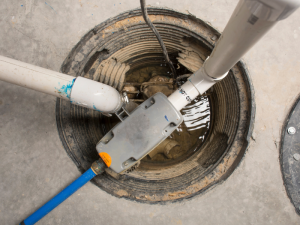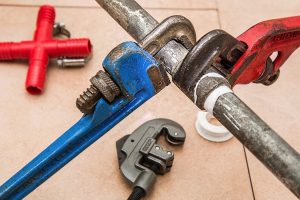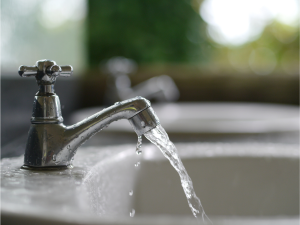If your home has a basement or crawlspace, you know how important it can be to have an operational sump pump. But you may have never considered how often a sump pump should run. There are many reasons that water can infiltrate your home, and it is vitally important that you get it out as quickly as possible.
One way that excess water enters your home is through plumbing leaks. Excess moisture can cause a whole list of health problems and structural damage. But you have been hearing your sump pump run when there should not be any moisture present, or you are not hearing it run when you expect it to. That raises the question, how often should your sump pump run?
What is a sump pump?
A sump pump is a water pump that is usually installed in the corner of your basement or crawlspace that should pump out any water that gathers in the space automatically. When installed, the installers will dig a hole or pour the concrete to leave a hole that the sump pump can sit down in.
A sump pump’s sole purpose is to pump unwanted water out of your space. This may be in your basement from a leaking foundation wall, or it could be a crawl space with improper drainage around it, or it could be that your home’s basement is below the water table, and water seeps in anywhere it can. Whatever the reason, a sump pump is there to pump out any water collected in the space. We have an article covering everything you need to know about sump pumps.
How does a sump pump work?
A sump pump is a water pump. It will have some float switch that is attached to it. When the water level rises high enough to activate the switch, the pump kicks on and begins pumping the water out of your home.
Usually, the pump will be plumbed through your exterior wall and pump the water away from your home. There should always be a check valve placed in the line so that when the pump shuts off, then the water it has pumped up the line does not flow back into the hole. This can cause your pump to run for an excessive amount of time.
Depending on when your pump was installed and whether a home inspector inspected it, the installers could have hooked your sump pump into your primary drainage system. This is something that you want to avoid. This can cause damage to your drainage system, as well as the city’s systems, if you are within a city’s water district.
Are there different types of sump pumps?
There are two main types of sump pumps. One of these is called a submersible, and the other type is a pedestal sump pump. They both work on the same premise of pumping the water out of your home but have slightly different applications.
Submersible sump pump: A submersible sump pump is precisely that it is submersible. This means that once you place it in that hole in the ground, it may be underwater for most of its life. But that is fine; these pumps are made to be submerged.
The downside to these pumps is the float which turns the pump on is usually attached high to the case of the pump. This means that the water level will have to get decently high before it turns on, and it may not get the water pumped out to as low of a level as you may like. This will not be a problem if you have the pump in a recessed hole, but it can be more of an issue if you are trying to pump out space.
Pedestal sump pumps: These pumps will have a base and afloat at the bottom, and then they will have a tall pedestal with the motor and electrical connections on top. This type can get the water pumped out to a lower level because of a more adjustable float, but the motor cannot get wet. This makes the pedestal sump pump a poor choice if your basement or crawl space is prone to extreme flooding.
How often should your sump pump run?
A sump pump should only run when it is needed. This could be a significant amount, and for various reasons. If you live in a very wet climate, then the water table may be higher than your basement floor, which means that the pump could run 2 or 3 times a day for a couple of minutes. If you live in a freezing climate when the snow is melting, your pump will be running more often. Or if it has been raining a lot, this could also be why it is running regularly.
How often should a sump pump run, and what if it runs excessively?
Your pump should run only when needed, but under steady demand, it should be able to pump out its pit in a few minutes. If you can hear your pump running for hours on end, you may need to investigate and see why it is running before it burns the pump up.
Faulty check valve: We discussed how a check valve would keep the water from flowing back towards the sump pump. When your pump has pumped enough water out, it shuts off immediately. This means that there is water in the pipe leading upward and out of your house that could not be pumped out. Usually, the check valve would keep it from coming back, but a check valve that is stuck open allows the water to flow back and fill the hole, which reactivates the pump.
Excessive water infiltration: This raises the question of how often should a sump pump run during heavy rain? If you are in the middle of a torrential thunderstorm, you may have more water seeping into your home. If all the rain has raised the water table, that may mean more water seeping into your home.
You might also ask how often should a sump pump run during rain of normal proportions? It will depend on how much water can get into your home. If your pump sits below the water table, it may run more than if it is at ground level. If you have feet of snow around your house, and now it is starting to melt, that could also be a pathway to water infiltration.
A clog: There are also multiple possibilities for why this can happen. If the pit the pump is sitting in is full of dirt and debris, it can clog its intake screen. If it is below freezing outside, the water could have frozen within the pipe, not allowing the water to flow through it. Or something could have caught the switch, causing the pump to run continuously.
Conclusion
Depending on your situation, having a sump pump may be a vitally important thing to have. You should know what is expected of your sump pump, how often should a sump pump run, if it should run more during certain weather events, and make sure that it is not running constantly.
Keeping an eye on your pump, ensuring that it does not run all the time, and performing essential maintenance will provide you with years of sump pump life, keeping your basement or crawlspace free of standing water. Also, if you notice something unusual about your sump pump, don’t hesitate to call a professional for sump pump services.




